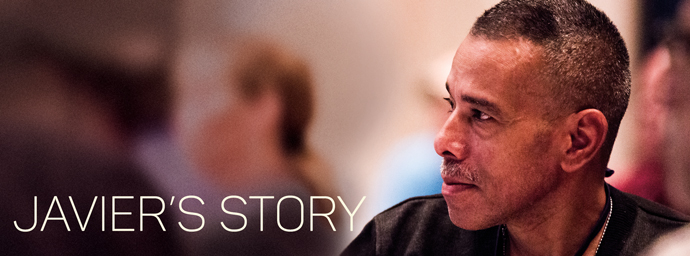In Your Words: Brothers in Arms, Part 1
Twin brothers Javier and Omar Estevez have been living with sarcoidosis for more than a decade. Within the past four years, they’ve also been diagnosed with pulmonary hypertension. They find strength and support in one another, and urge others with chronic illnesses to keep fighting with hope.

I’m a retired New York City police officer. The sarcoidosis came from inhaling the debris from the 9/11 attacks. I was there about two days after the twin towers fell. At first I did perimeter security around the buildings, then they had me doing search-and-rescue. Eventually we began to tackle digging through the rubble for remains. I worked there about four to five months.
One day a sergeant asked me to get masks for the entire team of 10-12 guys but the Occupational Safety and Health Administration (OSHA) group had run out of them. In the meantime they wanted us to use a handkerchief or our sleeve to cover our noses and mouths while we were working. They got new masks after a while but they were paper-thin and only good for short periods because the air penetrated through and then you were right back to having the dust inside your nose and mouth and down your throat.
My first symptom was shortness of breath. I have two daughters, who were young at that time, and one day they were asking me to chase them. We were playing tag and as I tried to catch one of them I fell. I couldn’t breathe. I reported the next day to work and saw the police department’s doctor. I told her how I was feeling and she sent me to a pulmonologist.
I saw that pulmonologist for six years. He would prescribe medicine and tell me there’s a real problem, but he would never tell me the problem. Finally, I went to a different pulmonologist. I told him my conditions and how I was feeling and he did about 2 ½ hours-worth of work during that first visit. He said I wouldn’t be able to return to work because I was so sick.
In 2007 my current pulmonologist told me I would need a lung transplant. He said not right away, but in due time. I’m still trying to get on the waiting list. I’ve started the process but there are a battery of tests and insurance regulations that I’m still working through.
In 2011 I was diagnosed with pulmonary hypertension. I’m not able to do much of what I used to do — I can’t walk without an oxygen tank, and even with the oxygen tank it’s limited. I just did a six-minute walk test and I failed that miserably. I was only able to walk two minutes at a slow pace. I have the hobby of metal detecting, walking around the beach to give myself some exercise, and I can’t do that anymore. Traveling now, vacation-wise with my family, is also difficult. My daughters are still young, they’re 14 and 15 and they want to participate in things like zip lines and go on rides, but I can’t do that. And, when we take long flights I’ve got to think about the oxygen tanks that I must bring on board.
It’s tough, but I have my family’s support. They help me cope. I’m able to attend church and I do research on the computer; I enjoy reading articles. Most of all, I enjoy spending time with my family.
You have to stay strong, positive, and not give up. If and when you get diagnosed, look for a second opinion. Most importantly, don’t give up on your life. Just because you were diagnosed with an illness doesn’t mean you should get depressed and lay about. It means you need to remain strong, remain active, and pursue whatever you want to do with your life. Don’t think that it’s over because there is medication that could very well help.
To have my twin brother, who has the same conditions, understand what we’re going through and understand the pain, is awesome. Our illnesses are very misunderstood. They mimic a lot of different things so it’s important that a proper diagnosis is made. The sooner you get checked out and diagnosed the better the prognosis later down the line.
It’s very important to share your story with others because people like myself, who are closed off, need to know that there are individuals with similar conditions who understand.
Most importantly, don’t dwell on the illness. Enjoy your life to the fullest extent because tomorrow is not a guarantee. I give that advice to enjoy life because I was told once I only had a limited amount of time, maybe at most three years, and those three years have already gone by.
By remaining positive you will see a change in yourself.
Click here to read part 2, Omar’s Story.
Contact us
Did you enjoy this story? Email us your comments and questions and let's keep the conversation going. We encourage you to engage with us and other readers by following us on Facebook, Twitter, and Pinterest. Every person's journey is unique, and every perspective is valuable to us.






